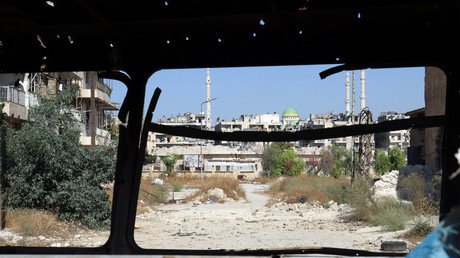Blackmail? 'UNHRC resolution attempt to quash Russian-Syrian anti-terrorist op in Aleppo '
Under threat of war crimes charges, the UNHRC resolution on Aleppo is attempting to make the humanitarian pause in the city permanent and ensure the offensive against terrorists there is not resumed, says former GOP senate foreign policy adviser Jim Jatras.
The UN Human Rights Council has voted to launch a special inquiry into the situation in the besieged Syrian city. The resolution says atrocities have been committed by all sides in the conflict and may qualify as war crimes.
Meanwhile, the heads of Russia’s armed forces have confirmed that the ceasefire in Aleppo has been extended for another 24 hours, until Saturday evening.
RT: The State Department told us on Thursday that the US has no strategy to fight Al-Nusra. But then we heard from the same spokesman that the US is concerned that rebels are shelling humanitarian corridors. So, there is no strategy, yet deep concerns. How does that work?
Jim Jatras: I think what they are trying to do is simply reinforce the notion that East Aleppo is uniquely a humanitarian question – it is not a question of an anti-terrorist operation by the Syrian and Russian forces. And that anything that could be done to be heightening that humanitarian question and pinning the blame on Damascus and Moscow fits into that scenario. I don’t think they take seriously that these are Al-Qaeda and their allies that they are essentially trying to protect. I think that is the essence of what happened at the UNHRC.
RT: The UN special envoy for Syria has praised the ‘humanitarian pause’ in Aleppo, adding that it’s also crucial to separate the opposition from the terrorists. Russia has been calling for this for many months now. Why is it still not happening?
JJ: Because they can’t do it. There are no moderates to separate from the terrorists. When the resolution was considered at the UNHRC, Russia offered an amendment to the resolution saying that this separation should occur. And of course, this was voted down by the same countries that passed the resolution in order to simply place the blame on Russia. I don’t think that there is a serious good will on the part of Washington, of London, the Saudis and the Qataris, who are also strongly behind the resolution.
"The double standard in this is obvious, it has been always obvious. What happened in Yemen and what is possible to happen in Mosul is the same thing. This is the usual tool that the West uses when it finds itself in a position where it cannot move forward. And it uses UN institutions for its interests," Damascus-based journalist Ziad Haidar told RT.
RT: The ‘war crimes’ resolution on Aleppo comes during the extended humanitarian pause supported by Russia. Why do you think about the timing?
JJ: I think what they are trying to do is to take advantage of the fact that the Russians and the Syrians have voluntarily undertaken this pause. And they have problems with this because it does allow the terrorist forces there to regroup, to continue their shelling of West Aleppo, and so forth. But for their own reasons, and I think because they do care about the humanitarian concerns of the civilians in Aleppo, they have voluntarily agreed to this pause. What I think the resolution is attempting to do though, is to say “we demand,” and the word is “demand” in the resolution, you make this pause permanent under the threat of war crimes charges, if you resume the offensive against the terrorists.
Ex-military officer and political analyst Brad Cabana echoed the statement by Haidar, saying: "The [UN] resolution is clearly political. It's clearly an attempt to use the United Nations for a political objective which really undermines the United Nations as an institution."
RT: Do you expect the investigation that the resolution calls for will conclude anything soon or is it likely to get bogged down?
JJ: I don’t know. My concern would be that when you have the majority of countries, and remember, there is no veto in the Human Rights Council, that if you have a majority of countries that are able to pass this resolution, they also would be able to determine the composition of the so-called independent investigation, it will come back with results that are tailor-made to its sponsors.
The statements, views and opinions expressed in this column are solely those of the author and do not necessarily represent those of RT.














